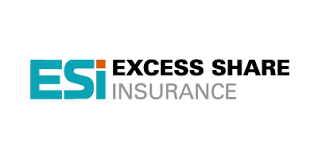Excess Share Insurance (ESI) Coverage Changes
Effective: October 1, 2023
Here at DOCFCU, we feel it’s not enough to offer great products and services. It’s the extra things we do that make our membership so rewarding. That’s why, since July 2005, we have provided our members with supplementary deposit insurance of $250,000 through the Excess Share Insurance Corporation (“ESI”), a private deposit insurer. This excess coverage is in addition to the coverage provided by the National Credit Union Administration (“NCUA”) and is provided for your protection at no cost to you.
Based on the limitations of the insurer, DOCFCU is provided a maximum of $48 million aggregate in ESI excess insurance coverage, which is the highest limit available by ESI for any credit union in America. However, our recent growth has pushed us past the $48 million maximum limit. Consequently, we have worked with ESI to develop an alternative that would allow us to continue offering excess share insurance coverage to our members.
Beginning October 1, 2023, depending upon how your account relationship with us is structured, accounts will remain federally insured for up to $250,000 by the National Credit Union Share Insurance Fund (“NCUSIF”). In addition, these accounts will also be insured up to an additional $100,000 by ESI, instead of the $250,000 per account coverage that was previously provided.

FAQs About Excess Share Insurance Changes
Excess Share Insurance is a private insurance company that provides additional coverage insurance that provides members up to $100,00.00 in coverage at no cost to the member. This is in addition to the $250,000.00 of share deposit insurance protection from the National Credit Union Administration (NCUA).
The change will be effective October 1, 2023, ESI insurance coverage is being reduced as a result of the growth of our organization. We have surpassed the ESI $48 million maximum aggregate limit.
The National Credit Union Administration is an independent federal agency that insures deposits at federally insured credit unions, protects the members who own credit unions, and charters, and regulates federal credit unions. ESI is the nation’s only multi-state provider of excess share insurance for credit unions. Through the NCUA and ESI, your funds are insured. Beginning October 1st, your coverage will be $250,000 from the NCUA and $100,000 from ESI.
The NCUA and ESI will insure your funds up to their limits based on your account. Any funds above those limits may not be covered.
Share insurance coverage can be increased only if accounts are held in different categories of ownership. These categories include the four most common ownership categories: single owner accounts, retirement accounts, joint accounts, Payable on Death (POD), and revocable trust accounts, living trust; and less common ownership categories such as irrevocable trust. If you want to determine your insured coverage, please visit the NCUA website to utilize their calculator and/or call them directly at 1-800-755-1030.
Please visit ESI website for more information.
No, we are not waiving any early withdrawal penalty fees.
If you and your family have $250,000 or less in all your share deposit accounts at the same insured credit union, you do not need to worry about your insurance coverage — your shares are fully insured. A member can have more than $250,000 at one insured credit union and still be fully insured provided the accounts meet certain requirements and are properly structured. In addition, federal law provides for insurance coverage of up to $250,000 for certain retirement accounts.
*These share insurance coverage limits refer to the total of all shares that account owners have at each federally insured credit union. The listing above shows only the most common ownership types that apply to individual and family shares and assumes that all NCUA requirements are met. For more information, please visit the NCUA site.
For more information regarding NCUA coverage, please visit their site.
Please visit our ESI page, or send us an email at service@docfcu.org, or contact us by phone at 202-808-3600 or 888-626-9845 (non local calls)
